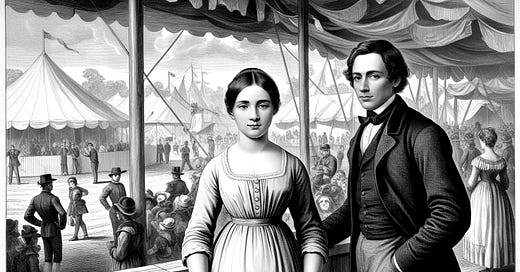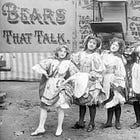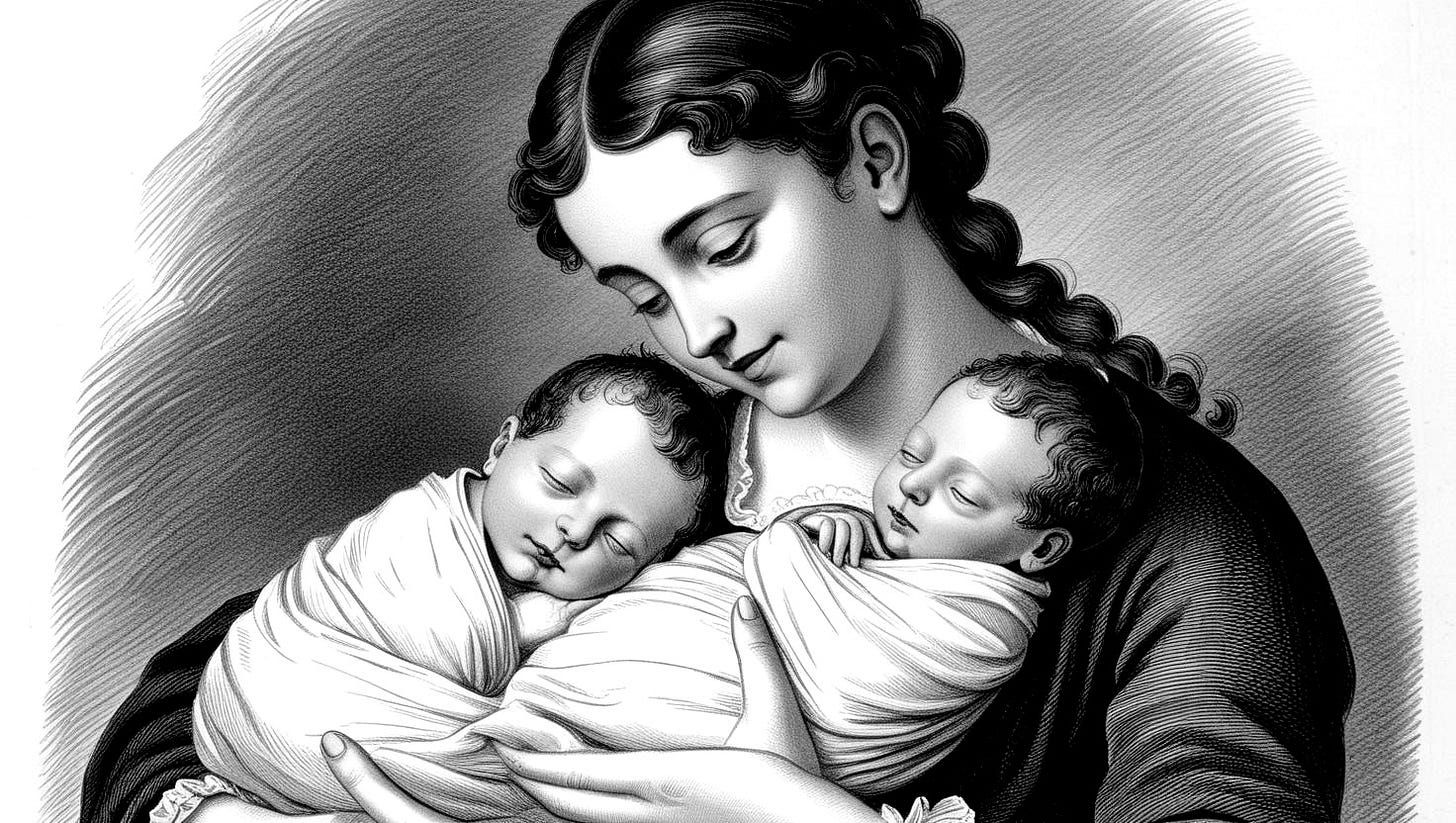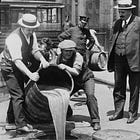The Show Must Go On: A Circus Story of Motherhood and Resilience PART 2
The remarkable tale of Blanche Pouche Leon
Before you start reading Part 2, make sure you’re all caught up!
Release Date: February 25, 2025
A journey of transformation
In 1863, the Royal Spanish Circus ended their European tour and headed to Havana, Cuba, to begin a tour of the West Indies — places like Saint-Domingue, Jamaica, Hispaniola, Puerto Rico and the islands of the Lesser Antilles. Passage on a steam-powered passenger ship had been secured for troupe members who’d signed on for the tour, among them, Joseph Leon and his pregnant wife, Blanche.
The ship the soon-to-be parents boarded was faster and more reliable than traditional sailing vessels, however, the journey from Cadiz to Havana would still take three to six weeks, depending on weather conditions and the route taken. Some ships stopped to resupply in the Canary Islands before crossing the Atlantic, while others stopped in New Orleans, especially if they carried cargo or passengers with business in the U.S.
It’s not known what route the ship Blanche and Joseph were on chose, but either way, it must have been a physically and emotionally difficult crossing for 15-year-old Blanche.
Choppy seas would have intensified the nausea and dizziness of morning sickness, and the limited availability of fresh drinking water and nutritious food may have added to the dehydration, fatigue and hardships of her pregnancy.
As one of the married performers, Joseph was likely given slightly better accommodations than single men or common laborers – a second-class cabin rather than bunks in steerage, for example, but even then, the cramped sleeping conditions, constant motion and noise of the ship, and lack of fresh air below deck must have made sleeping difficult.
Then, of course, there was the anxiety and uncertainty — of a dangerous ocean voyage and the many unknowns that awaited her and Joseph in Havana; of saying goodbye to dear friends who’d decided to leave circus life and stay in Spain, join other circus troupes in Europe or America or even return home to family; and most especially, of pregnancy and pending motherhood.
Pregnancy and what came after was largely a private matter, discussed in whispers within female circles but not openly taught to young girls, so Blanche — having left home at 13 —likely had very little firsthand knowledge of pregnancy and childbirth beyond what she might have observed in farm animals or overheard from the women around her.
All that changed on the passage to Havana.
As Blanche mended and updated costumes in preparation for the coming tour, the women who surrounded her — many of whom were already mothers and some who may even have assisted in births — shared their stories, answered her questions, calmed her fears and prepared her as best they could for the challenges of pregnancy, childbirth, breastfeeding, postpartum and newborn care.
By the time the ship steamed into the Havana port, Blanche may well have believed she was more than ready to face whatever came next. Whether she was or not was still to be learned.
Please hit the ❤️ button at the bottom of the page to help this story reach more readers. And if you’re not already a subscriber, I’d love to have you join me. Thanks!
The birth of a family
The first pangs of labor came to Blanche in the late fall of 1863 while the circus was set up inside Havana’s oldest town square, Plaza de Armas. Sometime later, she likely sent word for one of the more experienced mothers to come to the nearby public-house where she and Joseph lived.
Her confinement, she said, had come.
And although Blanche sent for just one woman, the room may have quickly filled with others, a true circle of support. A Big Top of love.
The small space would have been cleared and thoroughly cleaned to make a safe and hygienic cocoon for Blanche and her coming child. Blankets and fresh water, nourishing broths, medicinal teas and perhaps protective talismans would have been assembled.
As the minutes turned into hours and a baby had yet to be born, a local midwife – a free Black or Mulatto woman 1, was probably sent for to ensure the wellbeing and survival of both mother and child. Drawing on generations of practical wisdom and local herbal medicine, the "partera" would have been more qualified and experienced at repositioning babies, controlling bleeding with herbal compresses, and recognizing early signs of complications.
She would also have understood that there were two babies, not just one, struggling to be born.
Please hit the ❤️ button at the bottom of the page to help this story reach more readers. And if you’re not already a subscriber, I’d love to have you join me. Thanks!
It’s not known what complications and challenges Blanche overcame in delivering her firstborn children, but it’s likely there were many. Historically and at the time, delivering twins was a perilous event, and the combined risks of maternal hemorrhage, infection, and the labor and delivery complexities inherent in twin births often resulted in the death of one or both of the babies, as well as the mother.
Blanche, however, was lucky. She survived. And so did her sons.
The little ones were named Will and Willie. Perhaps William was a family name and, having been caught off guard by the appearance of two babies, and weakened by the extended delivery that had resulted in their births, Joseph and Blanche had simply chosen derivatives of the one name upon which they’d decided. Or maybe it was just a preference, a foreshadowing of the unique naming practice Blanche and her husband would carry forward in their family.
In the first few days after the arrival of her firstborns, Blanche’s physical recovery was delicate, precarious and likely overseen by her midwife as well as the women of her circus family. There would have been holistic remedies, traditional health care routines and gentle movements aimed at preventing infection and mitigating postpartum discomfort, and health-bringing soups, broths and simple meals to help the new mother regain the strength she needed to feed her newborns.
And teams of women may have temporarily taken on the task of caring for Will and Willie to allow Blanche to rest, recover and adjust to her new role as mother.
Like most fathers of the day, Joseph was likely banned from the sick room, especially as he was still performing his clown act nightly and interacting with potentially disease-carrying audiences.
The risk of harm was too high, at least in the early days.
But as time passed, Blanche healed, her babies grew less frail, and a new routine was established.
Blanche returned to the costume shop, likely keeping her sons close at hand in a makeshift crib as she nimbly created and repaired the exotic costumes so beloved by Cuban audience members. Older performers or women who had navigated motherhood themselves came by to watch over the little ones, giving the new parents time to relax and reconnect.
And Blanche and Joseph settled into parenthood.
Soon Blanche was expecting again. And once again, she was carrying twins.
Will and Willie were likely active toddlers by then, and the anxiety and trepidation Blanche had felt during her pregnancy with them had been replaced by joy. Despite the challenges and unpredictability of circus family life, she and Joseph had managed to keep their babies safe, healthy and alive during a time when much of the region was being ravaged by outbreaks of yellow fever, cholera, typhoid, smallpox, malaria and even civil unrest.
With newfound resilience and hard-won confidence and optimism, Blanche and Joseph welcomed two more sons, Joseph and Harry, into the family. 2
Although all four of the Leon children were born in Havana, it’s likely the port city served as a base of operations for the circus as well as a performance venue. Whether Blanche and the children traveled with Joseph as he and his fellow performers dazzled crowds in Caribbean port cities like Santo Domingo, Montego Bay, Kingston, San Juan and Bridgetown, or remained in Havana while the circus was on tour is unknown.
What is known, however, is that being part of the circus meant Blanche and her children were exposed to the full richness of international life during those early years of the West Indies tour, and it would color everything they did going forward.
They would learn to fluently communicate in multiple languages, and interact with people from around the world who held markedly different beliefs, values and customs. They would travel widely and experience both the glitter and glamour of the places they visited and the dirty underbelly.
And, each time the circus pulled up stakes and moved, they would learn to say goodbye — to the places that held so many memories, to the people they had come to trust and respect, and to the beloved members of their circus family they left behind.
Blanche, especially, would lean on those lessons of letting go as she entered what would be, perhaps, the most difficult and heartbreaking period of her life.
Copyright 2025 Lori Olson White
Have you read the incredible true story of Aimee Henry and Mary Martha Parker? Call Me a Bastard is my longest serialized story to-date, and the one that started it all here on the Lost & Found Story Box. Check out the story from the beginning.
And in case you missed it, here’s a link to my most popular short series to-date, The Incorrigible John George. I hope you’ll agree that “incorrigible” is the best way to describe this old scoundrel!
The Lost & Found Story Box is reader-supported. When you buy through links on our site, we may earn an affiliate commission.
End Notes
1 “The Economic History of Havana, Cuba: A city so Beautiful and Important it was Once Worth More than All of Florida”, by Thayer Watkins, San Jose State University Department of Economics,
2 No birth records have been found for any of the children of Blanche and Joseph who were born outside the United States. It could be their given names were more in keeping with French, Spanish of even local traditions, and ‘Americanized” later when Blanche sat for her 1895 interview. “Harry” may have started life as “Henri” or “Enrique”, for example, and Willie and Will as Guillaume or Guillermo.











Delivering two sets of twins into the big tent family in Cuba is truly remarkable!
I like the use of black and white AI generated illustrations. It really helps especially when you don't have "real" photos or images to add.